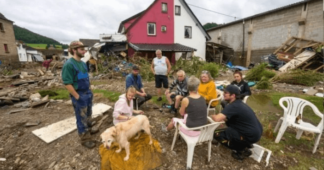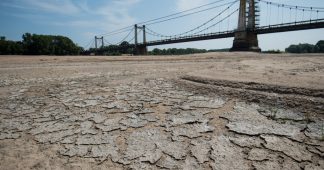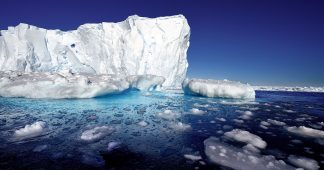“This is your climate on fossil fuel.”
By Julia Conley
Climate scientists on Friday were stunned by the intensity of flooding in Germany and Belgium that killed at least 120 people and damaged tens of thousands of homes, with experts saying they did not expect such extreme weather to result from the human-caused climate crisis as rapidly as it has.
More than a dozen records for rainfall were set across Western Europe, including in Cologne, where officials recorded six inches of rainfall in just 24 hours on Wednesday into Thursday morning—nearly double the monthly average for July. The city’s previous record for daily rainfall was only three inches.
“This week’s event is totally untypical for that region,” Dieter Gerten, professor of global change climatology and hydrology at the Potsdam Institute for Climate Impact Research, told The Guardian.
Aerial footage of Ahrweiler in Rhineland Palatinate showed fallen trees, abandoned cars, and indundated roads
Shocking images of the flooding in parts of Germany
This is #Ahrweiler in Rhineland Palatinate (video via @NicosPanoptikum) pic.twitter.com/hYnK2wAdmf
— Thomas Sparrow (@Thomas_Sparrow) July 15, 2021
According to the European Severe Weather Database, Reifferscheid saw more than eight inches of rainfall in just nine hours, leading to extreme flash flooding.
On Thursday night, officials reported that as many as 1,300 people were still unaccounted for, noting that the high number could be related to power supplies and cell phone networks being disrupted and some areas being difficult for rescue crews to reach.
Gerten expressed shock at the severity of the disaster.
“We seem to be not just above normal but in domains we didn’t expect in terms of spatial extent and the speed it developed,” Gerten said.
Climate scientists have warned for years that the continued extraction of fossil fuels is causing numerous changes in the climate, including extreme heat, drought, and more frequent and heavy rain—which has been linked to the warming of oceans and increased amounts of water evaporating into the air.
“With climate change we do expect all hydro-meteorological extremes to become more extreme. What we have seen in Germany is broadly consistent with this trend,” Carlo Buontempo, director of the Copernicus Climate Change Service at the European Centre for Medium-Range Weather Forecasts, told The Guardian.
But as the BBC reported, scientists said Friday they “failed to predict the intensity of the German floods” as well as the extreme heat which enveloped the Western United States and Canada in recent weeks, killing hundreds of people.
“The obvious acceleration of the breakdown of our stable climate simply confirms that—when it comes to the climate emergency—we are in deep, deep shit,” Bill McGuire, a professor emeritus of geophysical and climate hazards at University College London, told the BBC.
The effects of the torrential downpour stretched across Western Europe, with officials in Belgium saying Friday at least 23 people were confirmed dead and at least 19 were missing, and experts in the Netherlands and Switzerland expecting more inundation on Friday.
“We are still waiting for a definitive toll, but it could be that this flood becomes the most catastrophic our country has ever known,” said Belgian Prime Minister Alexander De Croo on Friday.
On social media, progressive organizer Doyle Canning of Oregon, where temperatures reached 116 degrees earlier this month, responded to a video of flash flooding in one German city.
“This is your climate on fossil fuel,” said Canning as she reshared the footage
My god. This is Germany today. pic.twitter.com/Wnf5pbBIYO
— Anthony Quintano (@AnthonyQuintano) July 16, 2021
The flooding came days after the European Union unveiled a plan to transition away from fossil fuels by 2030 as part of its plan to become carbon-neutral by 2050.
Armin Laschet, the governor of one of Germany’s hardest-hit states and a candidate to replace Angela Merkel as chancellor in the September elections, said the rising death toll and damage to communities across Germany demonstrated that “we need to continue Germany’s path toward climate neutrality even faster.”
Published at www.commondreams.org











